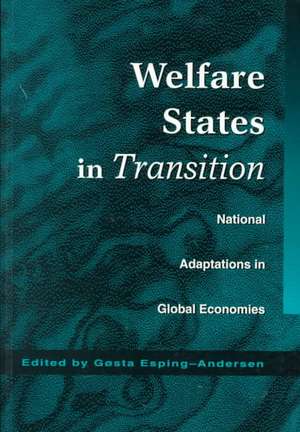Welfare States in Transition: National Adaptations in Global Economies
Editat de Gosta Esping-Andersenen Limba Engleză Paperback – 20 mai 1996
Preț: 507.09 lei
Preț vechi: 596.58 lei
-15% Nou
Puncte Express: 761
Preț estimativ în valută:
97.03€ • 101.78$ • 80.78£
97.03€ • 101.78$ • 80.78£
Carte tipărită la comandă
Livrare economică 01-15 aprilie
Preluare comenzi: 021 569.72.76
Specificații
ISBN-13: 9780761950486
ISBN-10: 0761950486
Pagini: 288
Dimensiuni: 156 x 234 x 19 mm
Greutate: 0.48 kg
Ediția:1
Editura: SAGE Publications
Colecția Sage Publications Ltd
Locul publicării:London, United Kingdom
ISBN-10: 0761950486
Pagini: 288
Dimensiuni: 156 x 234 x 19 mm
Greutate: 0.48 kg
Ediția:1
Editura: SAGE Publications
Colecția Sage Publications Ltd
Locul publicării:London, United Kingdom
Recenzii
`An impressive editorial feat which attests to the potential for well-structured and consistently integrated comparative social analysis providing, not only a cogent evaluation of the ironies of current policy developments, but also asserting that economic and political configurations may well ensure that "welfare states in transition" could retain the most positive and popularly valued elements of their "aquis"' - British Journal of Sociology
`Welfare States in Transition gives a comprehensive overview of the current state of affairs, as well as the problems of, on the one hand, the "established" welfare states, and, on the other, some of the states that do not have comprehensive welfare schemes, but which struggle with the social policy issues, and have to make decisions which also have an impact on the belief in the `welfare' concept as a whole.' Acta Sociologica
`This important collection of studies by political scientists and sociologists investigates the diverse responses of welfare states to their increasing unaffordability.' Population and Development Review
`This wide-ranging comparative analysis of contemporary and future changes in welfare states looks at the different trajectories of such states in Europe, North America and the Antipodes, and the emerging scenarios in Latin America, East Asia and Central and eastern Europe. Authors from these regions examine the current structures of social protection, consider the causes of the current welfare state crisis, and highlight evolving trends for welfare policy.' International Social Security Review
'This volume contains nine chapters developed out of a study originally commissioned by the United Nations Research Institute for Social Development as part of its preparations for the Copenhagen World Summit in March 1995.... an exceptionally coherent book which offers readers clear and wide-ranging access to some of the most innovative and informed analysis currently being produced by students of welfare states. In the editor's, words, it tackles "the future of the beleaguered welfare states of Western Europe, North America and the Antipodes (Australia and New Zealand), and the prospects for welfare state construction in the newly democratised nations in East Asia, Latin America and East Central Europe"... What is distinctive about the analysis found in all the chapters of this book is that it places the operation of welfare systems at the very heart of the adjustments that countries are having to make, or sometimes failing to make, in the face of a rapidly changing and increasingly competitive world market.... an exceptionally informed and intelligent debate about the future of the welfare state.' John Baldock - Policy Studies
`Welfare States in Transition gives a comprehensive overview of the current state of affairs, as well as the problems of, on the one hand, the "established" welfare states, and, on the other, some of the states that do not have comprehensive welfare schemes, but which struggle with the social policy issues, and have to make decisions which also have an impact on the belief in the `welfare' concept as a whole.' Acta Sociologica
`This important collection of studies by political scientists and sociologists investigates the diverse responses of welfare states to their increasing unaffordability.' Population and Development Review
`This wide-ranging comparative analysis of contemporary and future changes in welfare states looks at the different trajectories of such states in Europe, North America and the Antipodes, and the emerging scenarios in Latin America, East Asia and Central and eastern Europe. Authors from these regions examine the current structures of social protection, consider the causes of the current welfare state crisis, and highlight evolving trends for welfare policy.' International Social Security Review
'This volume contains nine chapters developed out of a study originally commissioned by the United Nations Research Institute for Social Development as part of its preparations for the Copenhagen World Summit in March 1995.... an exceptionally coherent book which offers readers clear and wide-ranging access to some of the most innovative and informed analysis currently being produced by students of welfare states. In the editor's, words, it tackles "the future of the beleaguered welfare states of Western Europe, North America and the Antipodes (Australia and New Zealand), and the prospects for welfare state construction in the newly democratised nations in East Asia, Latin America and East Central Europe"... What is distinctive about the analysis found in all the chapters of this book is that it places the operation of welfare systems at the very heart of the adjustments that countries are having to make, or sometimes failing to make, in the face of a rapidly changing and increasingly competitive world market.... an exceptionally informed and intelligent debate about the future of the welfare state.' John Baldock - Policy Studies
Cuprins
Foreword - Dharam Ghai
After the Golden Age? Welfare State Dilemmas in a Global Economy - G[sl]osta Esping-Andersen
PART ONE: DECLINE OR RENEWAL IN THE ADVANCED WELFARE STATES?
The Scandinavian Welfare States - John D Stephens
Achievements, Crisis and Prospects
Welfare States without Work - G[sl]osta Esping-Andersen
The Impasse of Labour Shedding and Familialism in Continental European Social Policy
Needs-Based Strategies of Social Protection in Australia and New Zealand - Francis G Castles
When Markets Fail - John Myles
Social Welfare in Canada and the United States
PART TWO: EMERGING NEW WELFARE STATES?
Options for Social Policy in Latin America - Evelyne Huber
Neoliberal versus Social Democratic Models
The East Asian Welfare States - Roger Goodman and Ito Peng
Peripatetic Learning, Adaptive Change and Nation-Building
Social Protection in Central and Eastern Europe - Guy Standing
A Tale of Slipping Anchors and Torn Safety Nets
CONCLUSION
Positive-Sum Solutions in a World of Trade-Offs? - G[sl]osta Esping-Andersen
After the Golden Age? Welfare State Dilemmas in a Global Economy - G[sl]osta Esping-Andersen
PART ONE: DECLINE OR RENEWAL IN THE ADVANCED WELFARE STATES?
The Scandinavian Welfare States - John D Stephens
Achievements, Crisis and Prospects
Welfare States without Work - G[sl]osta Esping-Andersen
The Impasse of Labour Shedding and Familialism in Continental European Social Policy
Needs-Based Strategies of Social Protection in Australia and New Zealand - Francis G Castles
When Markets Fail - John Myles
Social Welfare in Canada and the United States
PART TWO: EMERGING NEW WELFARE STATES?
Options for Social Policy in Latin America - Evelyne Huber
Neoliberal versus Social Democratic Models
The East Asian Welfare States - Roger Goodman and Ito Peng
Peripatetic Learning, Adaptive Change and Nation-Building
Social Protection in Central and Eastern Europe - Guy Standing
A Tale of Slipping Anchors and Torn Safety Nets
CONCLUSION
Positive-Sum Solutions in a World of Trade-Offs? - G[sl]osta Esping-Andersen
Descriere
`An impressive editorial feat which attests to the potential for well-structured and consistently integrated comparative social analysis providing, not only a cogent evaluation of the ironies of current policy developments, but also asserting that economic and political configurations may well ensure that "welfare states in transition" could retain the most positive and popularly valued elements of their "aquis"' - British Journal of Sociology





